If you are concerned about your privacy and security online using a VPN could give you some reassurance. Apple provides various measures in macOS that make Macs more secure, but if you want to ensure that the connection between your Mac and the internet is protected, rather than the computer itself, you need a VPN.
Using a VPN essentially makes you invisible on the web–your data is encrypted, your IP address is hidden, and you can even make it look like you are surfing from another country. This latter reason is the main reason many people use a VPN: they want to access services that are locked to a particular region, such as accessing U.S. Netflix from the U.K or BBC iPlayer from the U.S.
If you are looking for a VPN to protect your privacy and security online, and to grant you a way to access content as if you are in a different country, we are here to help. There are a lot of VPN providers vying for your business, which can make finding the best one to suit your needs difficult. To help you sort out the right provider for you, we’ve committed to extensive research and testing of VPN services that cater to Mac owners in our guide to the top VPN services for Mac.
Best VPNs for Mac: Reviewed & Ranked
Our top choice right now is NordVPN, which we feel stands out in many areas, from speed and privacy to unblocking and ease of use.
Below you will find the VPN services for Mac that we recommend based on our tests. Most of these will cost less than $3/£3 per month if you sign up for a one- or two-year deal. However, once the deal period ends the price often jumps, so it’s worth setting a reminder to shop around a month before your subscription runs out so you can search for a better deal, alternatively, you could cancel and sign up with another email address. You may be able to save money if you take a look at our round-up of VPN deals. ProtonVPN has a free tier.
All of these VPNs will also work on your iPhone and iPad as well, and many with Apple TV, but you might want to check out our separate guides to the best VPNs for iPhone and best VPNs for iPad.
1. NordVPN


Pros
- Easy to use
- Impressive WireGuard speeds
- Lots of servers
Cons
- Two separate apps can be confusing
Price When Reviewed:
Basic plan from $2.99 a month for two years + 3 free months. Usually $12.99.
Best Prices Today:
- 5,300 servers
- 10 simultaneous connections
NordVPN is one of the biggest and best-known VPN services. It’s a fully featured VPN option that’s secure, easy to use, and unbelievably fast compared to its competitors. There are cheaper options, with unlimited connections and more in-depth VPN features, but NordVPN is our top choice right now because it stands out in so many areas, from speed and privacy to unblocking and ease of use.
Nord has an up-to-date independent audit. It also has specialty servers for specific purposes.
There are more than 5,300 servers (none of which are virtual) available across 60 countries, which sounds great. You probably only care about the servers where you want to unblock content, but the more servers the better as it means you have a better chance of finding one that’s not overloaded. You won’t have to figure out which one to choose thanks to the handy ‘Quick connect’ feature that picks the server best suited to your needs.
Connections are fast and reliable, and NordVPN unblocks popular streaming services around the world including Netflix and BBC iPlayer. You can connect up to six devices simultaneously including your Apple TV.
Nord has added support for the faster WireGuard protocol in NordLynx, making it one of the fastest VPN services out there. However, it’s only available on the ‘IKE’ version of the app, which only offers a permanently enabled kill switch. To have more control, you’ll need to download the ‘OpenVPN’ version, albeit with slightly slower speeds.
Nord frequently has deals on offer that save money on the usual monthly price if you take advantage of the two-year plan. NordVPN offers three tiers: Standard, Plus and Ultimate. You can get Plus features (data breach scanner and password manager) or the Ultimate tier adds cloud storage and insurance options. Prices change all the time, so take a look at the prices and plans at NordVPN.com.
Read our full
NordVPN review
2. ExpressVPN


Pros
- Easy-to-use
- Broad device support
- Excellent speeds
Cons
- Illusive ExpressVPN team
- Expensive
Price When Reviewed:
From $4.99 a month for 2 years + 6 free months
Best Prices Today:
- 2,000 servers
- 8 simultaneous connections
If you want to circumnavigate geoblocking to get access to content not available where you live, protect your data while browsing the web from a public network, and keep your web browsing habits private, ExpressVPN, with its server locations across 105 countries, can do just about all of this with two or three clicks.
ExpressVPN is remarkably easy to use, but if you have any difficulties the 24-hour live chat means you can be connected to a real human to discuss issues within minutes.
There are native apps on iPhone, iPad, Apple TV, Mac, Android and Windows. Plus you can use it on eight devices at once (the limit was five previously).
Like all VPNs there is some speed loss because you are routing via a server in another country, but ExpressVPN does well to mitigate this, dropping less than 13% of download speed in our testing. NordVPN remains faster with a 12% loss in our tests, but ExpressVPN’s 13% is still better than most.
ExpressVPN offers no fewer than six different choices for protocol. Lightway, the company’s own option, is rapid. For improved compatibility you can switch to another version of Lightway or OpenVPN – things slowed down with 24% of speed loss with the latter.
There’s no Malware protection with ExpressVPN, but you can install a password manager called ExpressVPN Keys.
The company is headquartered in the British Virgin Islands, so it’s free from the majority of intelligence-sharing agencies’ jurisdiction. While it also operates a no-log policy, it doesn’t have PureVPN’s “always-on” audit process, but it undergoes audits each year.
ExpressVPN’s more expensive than many of its contemporaries and doesn’t allow access from unlimited devices (just eight). But you get a solid, speedy connection with minimal fuss, and you don’t have to tie-in for a two-year deal to get the best value. That latter point is important because VPN legislation can change regularly.
Read our full
ExpressVPN review
3. ProtonVPN
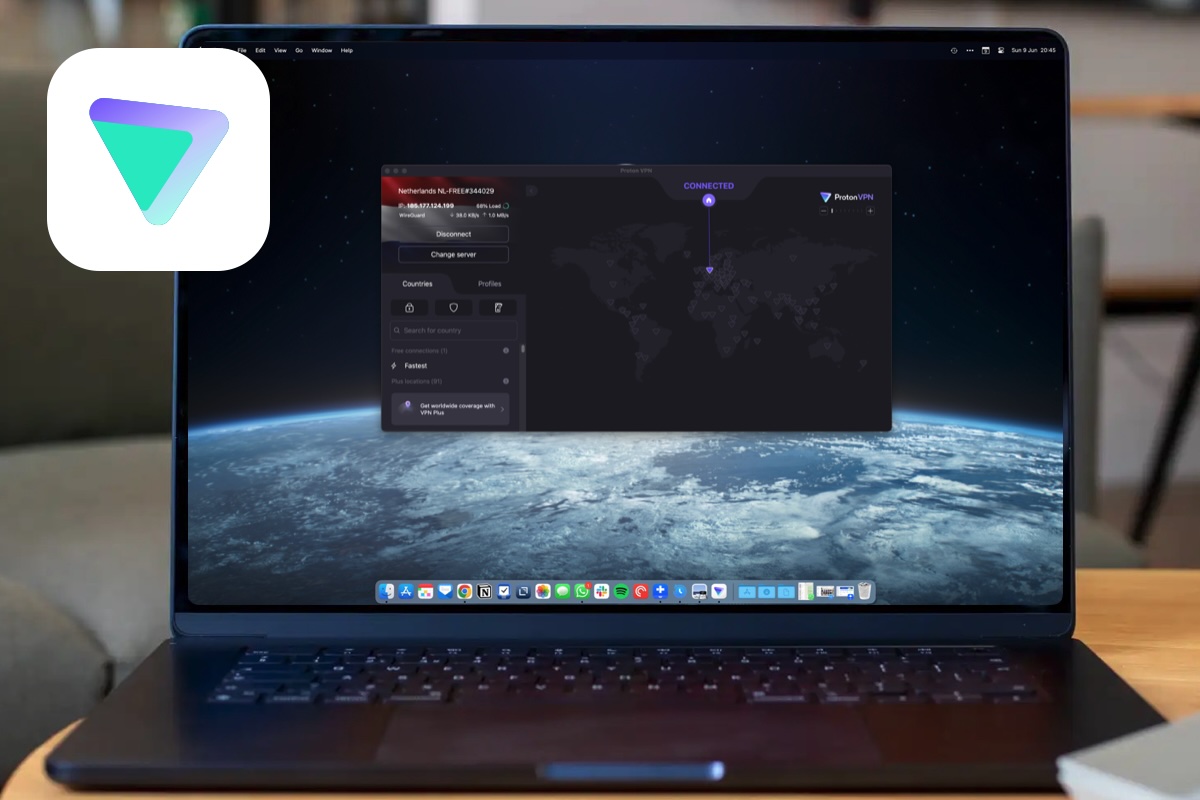

Pros
- Simple to use
- Free plan
- Great speed
Cons
- Setup on macOS was a little fiddly
Price When Reviewed:
From $4.49 a month for two years. Usually $9.99 a month.
Best Prices Today:
- 6,500+ servers in 100+ countries (access servers in 5 countries on free plan, on one device)
- 10 simultaneous connections
ProtonVPN‘s free tier of membership helps to set Proton VPN apart from some of its rivals. It’s naturally limited, with US, Japan, and Netherlands as the server locations and some speed drop – but it’s still pretty usable
If you pay for the service it offers a sleek interface, impressive connection speeds and just about enough features to improve your day-to-day web experience without throwing too many complex concepts at new users.
Proton VPN Plus offers a host of features, including an ad and tracker blocker and speed of up to 10 Gbps, as well as a 10-device limit. There’s Port Forwarding for downloads and gaming, too, as well as a Kill Switch for disconnecting should the VPN drop out.
Some VPN services offer features like dark web data notifications. Proton VPN sticks to the basics – and does so very well. The company’s “no-logs” policy confirms it doesn’t track sites, IP addresses, communications, or session lengths, nor does it track location-based information. Proton is Swiss-based, and only Swiss court orders can request data from the company, but since it doesn’t log data there’s very little it can offer to law enforcement.
For the privacy-minded, Secure Core, routes traffic through one of the company’s ‘Secure’ servers, minimizing the potential of a data leak. These secure servers are owned by Proton and are located in more than 90 countries.
Proton VPN does increase latency, but only by about 29% in our testing on a modest 60 Mbps broadband. In fact, it’s only about 7% slower when downloading and 5.5% slower when uploading, making it one of the slicker VPNs we’ve tested.
In terms of included VPN protocols, Smart will be ideal for most users, automatically setting the right protocol for your current usage, but WireGuard, WireGuard (TCP), IKEv2 and Stealth are also offered.
Proton VPN is an easy recommendation both for new and experienced users.
Read our full
ProtonVPN review
4. Private Internet Access


Pros
- Lots of servers
- Fast WireGuard speeds
- Split tunneling works well
- Unblocks BBC iPlayer
Cons
- Clunky Mac app
- Based within 14-eyes
Price When Reviewed:
From $2.19 a month for two years + 2 free months. Usually $11.99 a month.
Best Prices Today:
- 35,000+ servers, 91 countries
- Unlimited connections
Private Internet Access (PIA) is a powerful VPN designed for savvy users, offering “power user” tools and features such as custom DNS, connection rules, split tunnelling, and more at a lower cost than many competitors. The PIA Mac app offers pretty much everything its Microsoft counterpart does.
The app can be used on any device and offers servers in 91 countries. In my testing, the “auto” setting did a good job of picking servers that balanced speed and privacy.
The main window provides information on performance graphs, download and upload speeds, and quick settings for tools like Light Mode, Port Forwarding, and LAN connections.
While you can use PIA for getting around geoblocked content on your streaming services, PIA is more privacy-focused than other VPNs, with features like the Advanced Kill Switch, Split Tunnelling, port forwarding, and Multi-Hop server obfuscation. PIA also offers customizable features like automation setup and DNS options.
Private Internet Access can’t beat the speeds of NordVPN and Surfshark, and its stablemate CyberGhost VPN offers more impressive speeds, but at the cost of some power features. In our testing, we saw a reasonable drop of around 8% on Mac while using the PIA VPN. Upload speeds dropped considerably– by around 25%, which may be an issue if you do a lot of uploading.
Its zero-log policy has been verified by Deloitte Audit Romania.
Despite inconsistent speeds, Private Internet Access is a great VPN for all budgets with a wealth of features for privacy-inclined users.
Read our full
Private Internet Access review
5. Surfshark


Pros
- Fast WireGuard speeds
- Unlimited devices and connections
- Easy to use
Cons
- Kill switch can’t be customised
- Expensive to renew
Price When Reviewed:
Starter plan from $1.99 a month for two years + 4 free months. Usually $15.45 a month.
Best Prices Today:
- 3,200 servers in 100 countries
- Unlimited simultaneous connections
Surfshark is a great-value VPN that offers quite a lot features beyond the core VPN service for a low monthly price. SurfShark has more than 3,000 servers spread across 100 countries, making its network one of the widest and most varied of any VPN,
Its apps are easy to use and it reliably unblocks streaming services such as Netflix and BBC iPlayer. It’s missing the specialty servers offered by rivals such as NordVPN, who shares the same parent company, though.
Connection speeds are very impressive, and that’s thanks to the use of the WireGuard protocol. You really won’t notice any slowdown in your internet speed when Surfshark is running, so long as you have WireGuard selected and aren’t using servers the other side of the globe.
The company has upgraded all its servers so they run entirely in RAM, just like NordVPN and ExpressVPN. Running servers on RAM is better for privacy as data isn’t written to a hard drive. It’s also a member of the VPN Trust Initiative, while two-factor authentication (2FA) is a feature few VPN services offer. Being run from the Netherlands also means this is a privacy-friendly option.
The other reason to consider Surfshark is because it undercuts almost all of its rivals on price, yet doesn’t place any limit on the number of devices you can use simultaneously. Unfortunately, it can be pricy to renew once your initial contract runs out.
You can install and use it across many devices including your Mac, PC, Android and iOS devices, as well as browsers. It also supports multiple protocols (although OpenVPN is a little slower than we’d like) and excellent encryption, as well as a privacy-minded no-logs policy that’s regularly audited
There’s a kill switch and a Multi-Hop feature that routes your connection via two VPN servers for an extra layer of protection. However, there’s no GPS spoofing or split tunneling on the Mac (the latter being very uncommon on Macs anyway).
SurfShark offers three tiers of features at varying price points. The most basic option, aptly named SurfShark Starter, offers VPN functionality as well as an ad blocker and the option to generate a proxy email address and personal details for sites you don’t feel comfortable about giving your information to. SurfShark One adds email and payment detail breach alerts, as well as personal data security reports, antivirus and other malware protection, while the One+ plan adds data removal from company databases and people search sites. In addition to the VPN there are Alert, Search or Antivirus packages, that are available for an extra cost.
Just like most VPNs SurfShark offers discounted pricing if you sign up for two years, with the prices changing all the time. Just beware that at the end of the period the price will increase unless you cancel.
Read our full
Surfshark review
6. ClearVPN
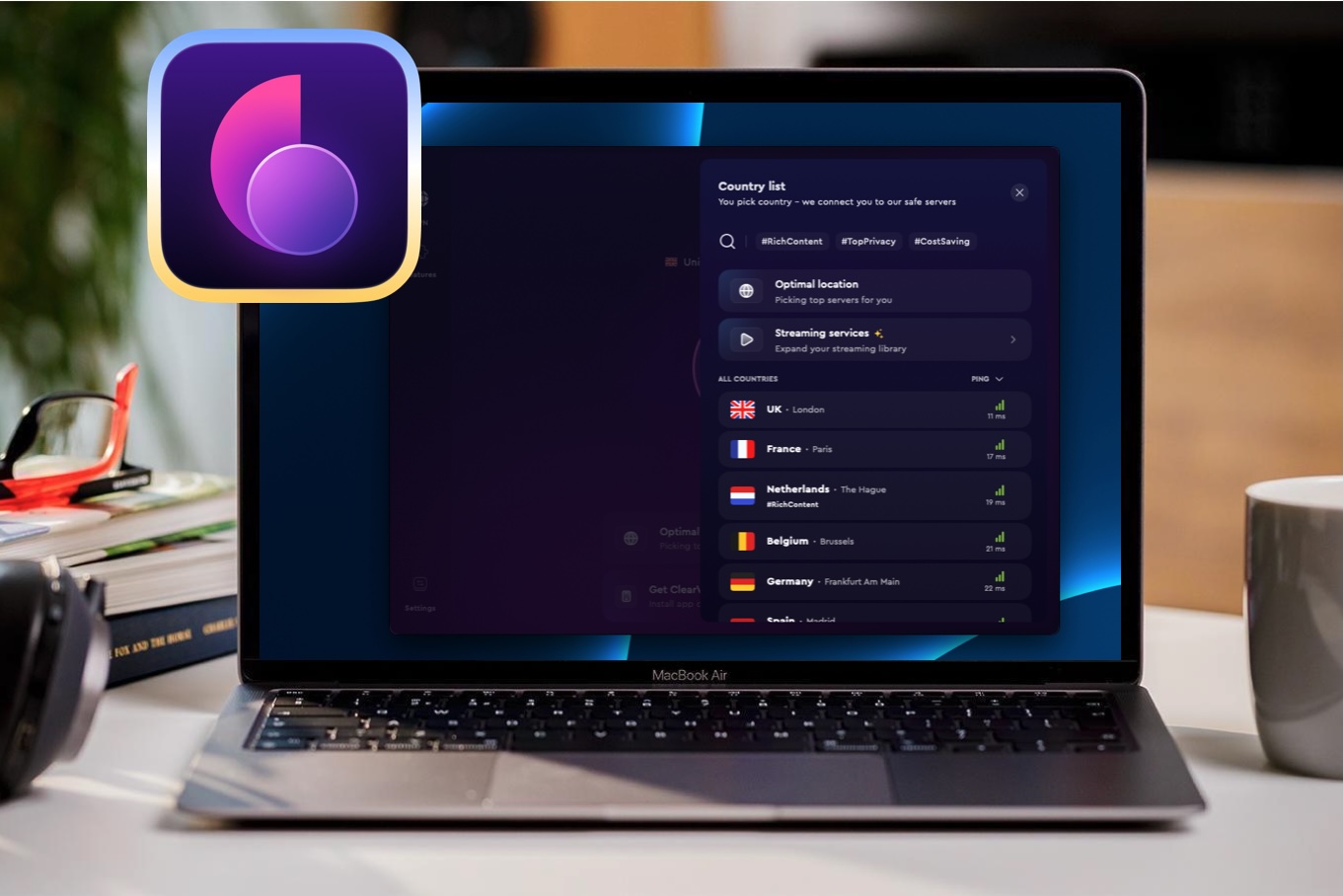

Pros
- Nice design.
- Great for getting around geo-blocks.
Cons
- Lacks some features like split tunneling.
- Not the fastest.
Price When Reviewed:
Three day trial. Currently $49.99 a year, usually $119.88 a year ($9.99 a month).
Best Prices Today:
- More than 50 servers
- Six device limit
MacPaw’s ClearVPN service is a VPN that lacks many more advanced features offered by its rivals, but on the other hand, it’s one of the easiest to use. With a nice UI and easy-to-use features it’s thoughtfully designed for VPN newcomers. It really is as simple as hitting a button to connect.
In the settings are options to block ads, keep ClearVPN in the dock, and a Kill Switch so that you can cut traffic from your device if the connection to the VPN is broken.
It’s all pretty basic stuff, but it’s offered in such an easy-to-use way that it’s hard not to appreciate the simplicity. There are also handy keyboard shortcuts to move around the app.
There are more than 50 servers, which sounds like a lot, but it’s dwarfed by many rivals to the tune of thousands of servers. That means your choices are limited, but at least ClearVPN lets you filter between Optimal Location or jumping straight to something like Disney Plus US or UK.
One of the more common power user features for VPNs is split tunneling, which lets some traffic go through the VPN while some goes around it. That’s not supported here.
Sadly, MacPaw’s VPN speeds also need some work. We saw considerable speed drops across multiple servers – even closer ones. We saw drops of around 20 to 30 percent in download speed, and around 50 percent for upload speed. It’s still fast enough to use Netflix, but it’s slower than the majority of alternatives out there.
Most VPN companies use external auditors to verify that they’re not recording user or session data, but ClearVPN hasn’t undergone one at the time of writing. This shouldn’t mean anything untoward as the company is headquartered in Ukraine, which falls outside of various surveillance alliances, so it can’t be asked to share your data.
ClearVPN is priced affordably, but prices and the deals on offer change all the time with VPNs. Look out for low monthly prices that don’t lock you in for too long. There’s a six-device limit.
If you’re new to using a VPN service, ClearVPN makes a compelling case to be your first choice, and stress-free access to Netflix around the globe, it’s a great starter option. Still, the speed drop and lack of common features like split tunneling likely mean power users should look elsewhere. You can save money by paying for the first year up front, but you can also pay monthly.
Read our full
ClearVPN review
7. PureVPN


Pros
- Easy to use
- Works on multiple devices
- Additional power user features
Cons
- Obtuse pricing model.
- Caused many websites to question whether we were “human”
Price When Reviewed:
From $3.99 a month for one year + 4 free months. Usually $12.45 a month. A 5 year deal is available from $2.16 a month.
Best Prices Today:
- 6,500 servers, 78 countries
- 10 simultaneous connections
If you’re looking for a flexible VPN service that will get around geoblocking and is easy to use, PureVPN is well worth a look.
The basic plan includes the VPN service and nothing more, but you can add a Password Manager and File Encryption tools in the Plus plan. The Max plan adds a Digital Privacy Manager that requests your records be scrubbed by data brokers, blocks web trackers, and recommends ways to maximize your privacy.
Whichever plan you opt for you’ll be able to connect 10 devices at once. PureVPN will run on your iPhone, iPad, Mac and Apple TV, and is easy to use on each to let you connect to over six thousand servers.
As far as getting around geo-blocks, we found PureVPN to be as easy as any other service to use. Select a location, load your streaming service or app of choice, and you’re off.
PureVPN is registered in the British Virgin Islands, which is more privacy-friendly than Hong Kong where it operated previously. PureVPN offers one of the more impressive no-logging policies, with an ongoing “always-on” audit process whereby an auditor can request confirmation of that policy at any time.
PureVPN has been winding down its virtual servers, of which it has less control. There are still 23 such servers, but PureVPN is transparent about which servers are virtual and which are physical – you can see a small ‘v’ next to each virtual server on the PureVPN website.
At the time of writing PureVPN is offering more than a whopping 80% off its plans if you sign up for 24 months. Two years is a long time in the world of VPNs, but at least means the full monthly pricing won’t kick in twelve months time. See PureVPN offers here.
Read our full
PureVPN review
8. CyberGhost


Pros
- Simple to use
- Decent speeds
- Plenty of servers
Cons
- Two-year plans are much cheaper
- Lacking some power user features
Price When Reviewed:
$2.19 a month for two years + 2 free months. Usually $12.99 a month.
Best Prices Today:
- 11,000+ servers in 100 countries
- 7 simultaneous connections
CyberGhost is a user-friendly app that connects to numerous servers worldwide, making it ideal for streaming Netflix from different countries and routing traffic away from untrustworthy open Wi-Fi networks.
It offers core features like kill switch support, split tunnelling, and no bandwidth restrictions. CyberGhost’s no-logging audit history is thorough, and there is a 45-day free trial available.
CyberGhost apps can be downloaded for various platforms, including Chrome extension and game consoles (we tested on Mac and iPhone). The app offers a simple “click and go” connection process, with a list of server nations and multiple locations. Encryption is standard across servers, and split tunnelling prioritizes traffic where needed. An automated kill switch can cut connections if the VPN drops out, while ‘Block content’ blocks DNS domains for ads, trackers, and malware.
The app does not offer anything like Proton VPN’s Secure Core or additional features like a Password Manager, but subscription tiers are based on adding a dedicated IP address. The VPN has over 9,000 servers located in over 100 countries, with plans to expand in South America and Asia in late 2023.
CyberGhost VPN has an impressive no-logs policy, meaning no one can access records of your activity while connected to the VPN. The app does not offer the Dark Web monitor offered by NordVPN, but it does have an automated kill switch to cut connections if the VPN drops out. The DNS blocking feature is easy to use but doesn’t allow you to choose what to block.
CyberGhost offers a compelling package with just one main plan and a 45-day money-back guarantee. It’s an excellent VPN for newcomers, with impressive audits, an array of servers, decent speeds, and easy-to-use apps.
Read our full
CyberGhost review
9. Norton Ultra VPN
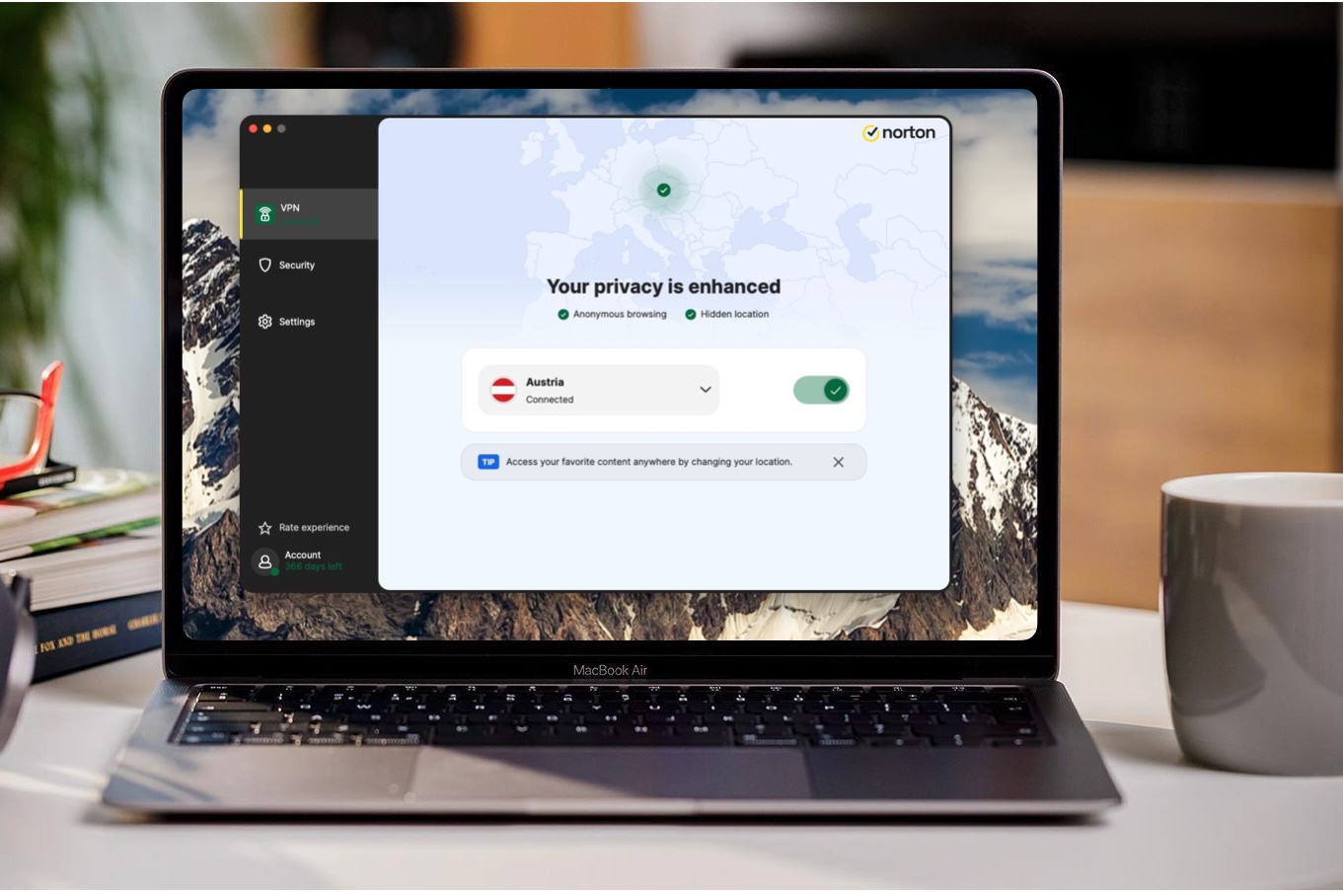

Pros
- Antivirus protections
- Cloud Backup and Password Manager
- Email tracking quarantine
Cons
- Slower than rival VPNs
- Inflexible payment options
Price When Reviewed:
First year is from $39.99 Norton Secure VPN; $49.99 Norton Ultra VPN; $59.99 Norton Ultra VPN Plus. Renews at a higher price of $79.99/$109.99/$129.99.
Best Prices Today:
- Servers in 32 countries
Norton has decades of experience protecting devices from cyber threats (read our review of Norton 360), but what or its VPN?
Norton’s VPN plans are, outside of the basic tier, tied into its security software to help offer real-time protection from bad actors. It comes with a password manager, dark web monitor, and cloud storage, but the VPN side of things is a little lacking.
Perhaps it’s from testing so many of the best VPN services that we’ve grown used to a certain set of non-negotiables. Chief among them is browser extension options to allow for quick switching, but at the time of writing, there’s no such offering from Norton.
Still, if you’re looking for real-time protection it remains a good security-focused option, but with geoblocking being inconsistent in our testing, you might want to look elsewhere for your international Netflix fix.
Norton’s VPN does include plenty of accoutrements that other VPNs either don’t have or charge extra for. You can install the app on your iPhone, iPad, and Mac, and all three platforms have apps that work well and run nicely in the background.
Norton offers Browser Protection, which scans sites as you browse. Norton also scans files before they land on your device. This worked well in testing, with barely added any additional time to the length of downloads. There’s a password manager, but it’s tied to the middle subscription tier and above.
One thing that was interesting was how it monitors trackers on emails. As a journalist, I receive a lot of press releases and pitches, and while I’ve always assumed many of them use some kind of tracking to see when they’re opened, Norton offered to quarantine so many that I was quite taken aback.
VPNs naturally decrease your internet speeds as your signal is fired across the globe, and Norton has servers in 32 countries – a steep drop from the 111 in NordVPN’s portfolio – but it does offer four protocols to choose from. IKEv2, OpenVPN and WireGuard are pretty commonly found across the board of rivals, but Norton has its own Mimic protocol which is intended to be ideal for unblocking international streaming services. Sadly, testing on a 70 Mbps connection saw a consistent speed drop-off. As for Mimic, Norton’s own VPN protocol, I was disappointed to find some international streaming services simply weren’t able to be unblocked with it. Norton clarified that Mimic is specifically designed for customers with special use cases who are unable to use WireGuard. We did have more luck with the more standardized protocols.
VPNs worth their salt should always focus on privacy as their primary concern, and Norton does a good job, having undergone an audit from VerSprite, a security firm.
It’s not a bad VPN, and if you’re looking for an option that packs a whole host of cyber-security tools into one easy-to-use package, it’s a great option. It’s disappointing that there is only a pay yearly option, where other VPNs have the option to pay monthly. Added to that is a steep jump in price for the second year.
Read our full
Norton Ultra VPN review
10. FastestVPN
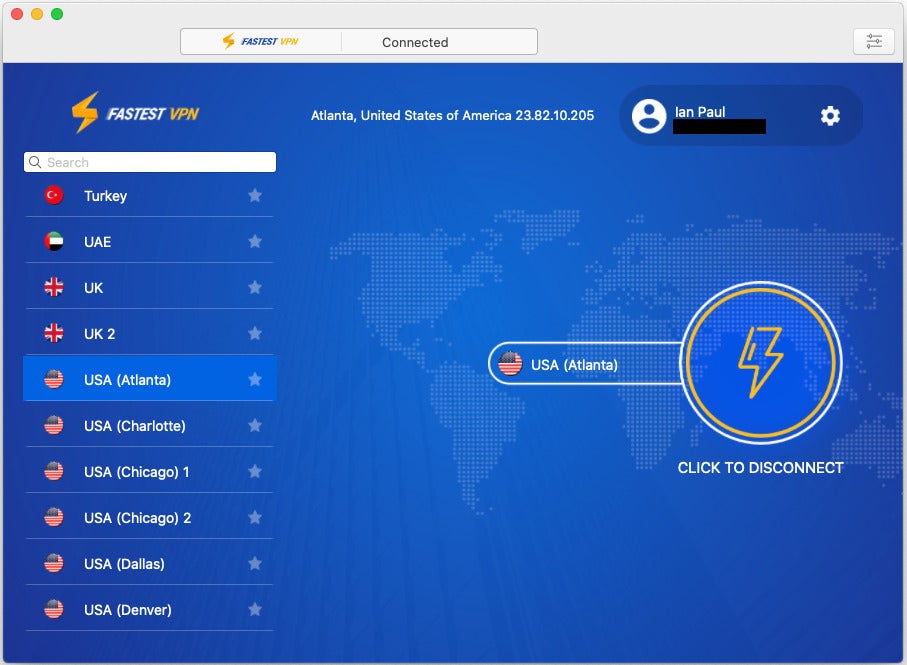

Pros
- Affordable pricing
- Good speeds
- 10 simultaneous connections
Cons
- Limited compared to the Windows app
- Limited VPN protocol options
Price When Reviewed:
Lifetime special deal: $40, usually $600
Best Prices Today:
- 800+ servers in 49+ countries
- 10 simultaneous connections
This easy-to-use, attractive, and uncomplicated app is a great option for VPN newbs. In addition to its straightforward and uncluttered design, FastestVPN also offers good speeds and a sufficiently expansive network. It’s icing on the cake that its privacy policy is easy to understand and makes all the right promises.
In our tests, FastestVPN maintained about 30 percent of the base speed across five locations on multiple test days, although there were some weak spots in Asia and Australia.
Despite it’s name it’s not the fastest VPN, but FastestVPN does make the right privacy promises in a way that’s easy to understand.
Read our full
FastestVPN review
11. Hide.me


Pros
- Fast WireGuard speeds
- Dedicated streaming servers
- Impressive free tier
- Only VPN that offers Split Tunnelling in Big Sur and beyond
Cons
- Slightly clunky UI
- No recent independent audit
- Premium plans are expensive
Price When Reviewed:
From $3.84 a month for 2 years + 2 free months. Usually $9.95 a month.
Best Prices Today:
- 2,600+ servers in 90 countries
- 10 simultaneous connections
Hide.me is another VPN service that has improved considerably in recent years.
As well as offering a completely free version (which none of its rivals here do), it has also added WireGuard, which is considerably faster than other encryption protocols.
Other key features include a customizable kill switch and split tunneling. Hide.me is the only VPN to offer Split Tunnelling in macOS. They state on their website: “hide.me VPN for macOS supports split tunneling. You can configure it in the client’s settings.”
Hide.me also offers Stealth Guard, which stops selected apps from running without the security of a VPN connection.
It can unblock Netflix and allows you to access BBC iPlayer from outside the UK. There’s also solid device support, with up to 10 simultaneous connections permitted.
Malaysia-based, in recent years it has expanded the number of servers and doubled the number of countries it covers. Unfortunately, the third-party audit hasn’t been updated since 2015
However, the user interface on Mac is a bit clunky, and we’re still waiting for an update to the 2015 no-logs policy certification.
Read our full
hide.me VPN review
12. VyprVPN


Pros
- Fast WireGuard speeds
- Very easy to use
- Unblocks Netflix and BBC iPlayer
- Low starting price
Cons
- Comparatively few servers
- Not clear which servers are virtual
- Patchy support experience
Price When Reviewed:
From $3 a month for two years. Usually $10 a month.
Best Prices Today:
- 70 servers
- 5 simultaneous connection
VyprVPN offers everything most people are looking for in a VPN, without needing to spend much money.
You get fast WireGuard speeds, alongside separate protocols focused on reliability, anti-censorship and ease of use. It’s also excellent at unblocking geo-restricted content, whether that’s local versions of Netflix or BBC iPlayer & ITV Hub from outside the UK. Premium features such as split tunneling and a kill switch are here too, even if the latter can’t be customised.
VyprVPN’s no-logs policy has been independently audited, and the service adheres to a strict Privacy Policy from parent company Golden Frog. More than 700 servers in over 70 countries should be plenty for most people, although there’s often only one per country. It’s also not clear which of these are physical and virtual.
Nonetheless, it’s still speedy, reliable and affordable.
Read our full
VyprVPN review
13. Malwarebytes Privacy VPN (Mac)
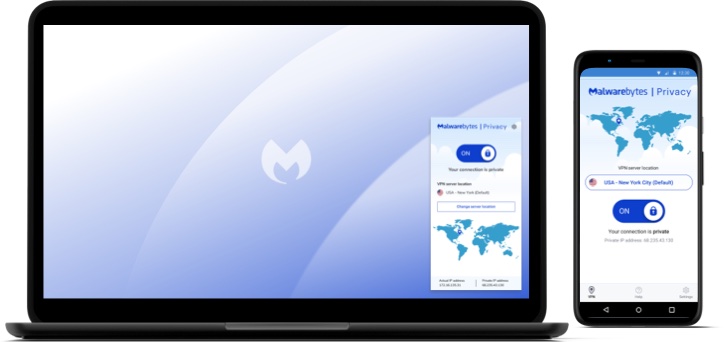

Pros
- Easy to use and understand
- Supports WireGuard protocol
- Clear privacy policy
Cons
- Not a lot of features
- Other VPNs have more anonymity features
Price When Reviewed:
$3.33 a month for 1 device ($39.99 a year)
Best Prices Today:
- More than 245 servers
- 32 countries
Malwarebytes, probably best known for antivirus software and advice, also offers a standalone VPN service called Malwarebytes Privacy. It’s an easy to use app with the right kind of privacy promises – as you’d expect from a respected name in security based in the U.S.
In our tests Malwarebytes was a mid-tier performer in terms of speeds, but it should be good enough for most casual users.
Malwarebytes Privacy VPN does a good job.
Read our full
Malwarebytes Privacy VPN (Mac) review
Best Free VPNs for Mac
There are also a number of free VPNs available, but beware that some severely restrict which servers (and therefore countries) you can connect to and the amount of data you can download through those servers. You may be able to save money if you take a look at our round-up of VPN deals.
It’s also important to read the terms and conditions before using a free VPN, as in rare cases they sell your data to third parties to offset the cost of you using it without paying. It’s a bigger problem on iPhones and Android where unscrupulous companies try to cash in on the VPN ‘gold rush’ and offer up poorly put together apps. Stick with our recommendations and you’ll be safe from these, though.
Do Macs need a VPN?
There is a big question. Do Mac users even need a VPN? Since Apple introduced iOS 15 and macOS Monterey in 2021 the company has offered a handy private relay service. iCloud Private Relay acts a bit like a VPN because it encrypts your web-browsing traffic and sends it through a relay to hide your location, IP, and any information about what you were browsing. iCloud Private Relay solves part of the problem that Mac users have used VPNs for in the past–it means that companies cannot build a clear picture of you on the web, thereby protecting your privacy.
iCloud Private Relay has some disadvantages: it only works when you are using Safari, you have to be a subscriber to iCloud, and you can’t use it to pretend to be surfing from another country in order to access content that is locked to a particular region. Read more here: iCloud+ Private Relay explained.
If you are a subscriber to iCloud, and only use Safari, then iCloud Private Relay will provide you with some anonymity when you are surfing the web. You may therefore be thinking that this means you don’t need a VPN to hide your location and identity. However, iCloud Private Relay does not allow you to choose an IP address or a region, and you won’t be able to make it look like you’re coming from another location. So you can’t watch geographically locked Netflix content, for example.
How we test VPNs
For each VPN service we review, we conduct tests at three different times of the day: morning, afternoon, and evening, using Ookla Speedtest. We start by measuring the speed of our unprotected internet connection before testing the upload/download speeds of the VPN service. These tests are conducted to servers located in North America, the UK, Europe, Oceana, and Asia over an ethernet connection with a service provision of 100Mbps.
To test upload and download speeds, we close down all background internet processes on the Mac, using TripMode. The only traffic on the system able to upload or download any data is Ookla. We use this setup to ensure that the numbers that Ookla produced were not stymied by anything else that the computer may have been doing at the time. The speeds Ookla captured were then averaged, providing us with a final numeric score.
We then use those scores to calculate a percentage of difference in speeds, which is what you’ll see in our reviews. Since internet speeds change constantly based on server load, how fast your connection is, and a gazillion other factors, we feel this provides a better picture of what you can expect from a service, on the whole, than merely quoting the exact upload/download speeds we encountered during testing.
Speed isn’t the only quantifiable metric that we look at. The number of countries that a VPN offers servers in, total number of servers worldwide, and how much it’ll cost you to connect to those servers on a monthly or annual basis are also taken into consideration when recommending a VPN service to you.
Additionally, we conduct hours of research into the VPN providers to find out who owns them, where they’re based, what they do with subscriber information, and whether the provider has a track record of questionable business practices.
What’s a VPN?
VPN stands for virtual private network. If you’re not using a VPN, when your computer connects to the internet, it does so through the local gateway provided by your internet service provider (ISP). Doing this allows you to connect to all of the online services you use everyday.
However, connecting this way also allows an ISP to know your physical location based on where you access the internet—be it at home, at work, in a cafe, or at a public Wi-Fi hotspot. This information is often sold to marketers and other parties interested in getting to know more about you and your browsing habits.
Worse still, if you connect to the internet through an access point with weak security, such as at an airport, mall, or local library, hackers connected to the same network could intercept personal information like your social media passwords or banking credentials through what’s called a man-in-the-middle attack. A VPN service can help prevent all of that.
A VPN creates an encrypted digital tunnel between your computer and the server of the VPN service you choose to use. Once this tunnel has been established, your web searches, the sites you access, and the information you submit online will be hidden from prying eyes. This means that your ISP can’t log or sell your information and hackers using the same network as you will find it difficult to initiate an attack on you. Almost no one will have any idea of what information you’re accessing.
For our recommendations of Mac Antivirus Software that we have tested see: Best Antivirus for Mac 2024: Top Security Software Compared.
VPN apps are very easy to install and use but for a step-by-step guide, read how to set up a VPN on a Mac.
What a VPN can’t do
A VPN can’t protect you from viruses, malware, or ransomware attacks if you choose to download an infected file, or a visit site designed to inject your computer with malignant code. It won’t keep spoofed sites from stealing your personal information, if you happen to visit one. So, you’ll want to bone up on online security best practices.
You should know that while using a VPN will allow you to anonymously engage in peer-to-peer file-sharing/torrenting, some service providers may cancel your VPN subscription or turn over your information to the authorities if they catch you trading copyrighted material with others.
Is it legal to use a VPN?
While accessing locked content is a bit of a gray area, due to licensing agreements, we don’t blame anyone who is desperate to watch the latest season of their favorite program when it airs in the U.S. rather than waiting for it to come to their country. Paying to watch a streaming service that’s not available in your country has to be less morally wrong than actual piracy! For more information on the legalities and whether it is safe to use a VPN read: Is a VPN safe for Mac?
What to look for in a VPN
A clear privacy policy. A good VPN should offer an easy-to-understand privacy policy that outlines what, if any, information the company collects from its users. It’s important that this policy details what they do with this information. Some VPN providers, especially those that offer their services for free, sell their user information to advertisers and other interested parties, just like an ISP does. Choose a provider that offers a level of privacy that suits you.
Know where the provider is based. Many countries have no laws demanding that VPN providers maintain logs of their users’ activity. This makes maintaining your privacy more assurable than it would be if you use a VPN located in a country that requires that user-activity records be maintained. Some companies, in an effort to make their network of servers look bigger or more varied than it actually is, spoof the locations of their servers.
The more servers, the merrier. Choosing a VPN provider with a ton of servers around the world is important for a couple of reasons. First, having a multitude of servers to choose from means that you won’t be forced to connect to an overpopulated server where the data flows like mud.
Second, having a wealth of servers to choose from both at home and internationally means more opportunities for spoofing your location, allowing you to hide where you are or access region-locked content with ease.
Multiple payment options. It’s a vicious circle. Paying for a VPN with a credit card online before you have access to a VPN could allow your financial information to fall into the wrong hands. Look for providers that offer alternative payment options such as PayPal, Bitcoin, AliPay, or via the Mac App Store.
An easy-to-use interface. It takes a lot of digital wizardry to connect to a VPN. Some people want to see how their VPN operates, behind the scenes. Using an open source VPN client like Tunnelblick is great for this. Most folks, however, just want their VPN to work with minimal frustration. Look for a VPN service that offers a Mac client with an easy-to-use interface.
Protection for all of your devices. A good VPN service will offer licenses for multiple devices to protect your loved ones’ computers as well as your personal smartphone and tablet. To this end, before investing in a VPN subscription, make sure that it provides software clients for all of the devices you own.





